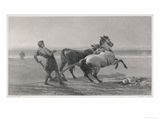The above quote is from the great South American "Liberator" General Simon Bolivar, who was one of the chief architects of Latin American independence from Spain. As a current student pursing a graduate degree in Professional and Technical Communication at the New Jersey Institute of Technology, my goal is to understand the instrumentality of words and images in promoting effective communication. In the spirit of Bolivar, this site will be used to promote the achievement of independent thought and progressive development in the field of Technical Communication.
"Plowing the River" is a term used by boat pilots and ship captains, who often had to steer their vessels through sandbars, ice and other debris, to create a new path for those who followed. In contrast to Bolivar's revolutionary seas, (which must have been very difficult to navigate at times), this site will approach future developments in technical communication from the perspective of the outward journey of the self.
Consider this excerpt from the T.S. Eliot poem, "The Dry Salvages" (No.3 of Four Quartets)
"The River is within us, the sea is all about us;
the sea is the land's edge also, the granite
Into which it reaches, the beaches where it tosses
Its hints of earlier and other creation:
The starfish, the horsehoe crab, the whale's backbone;
the pools where it offers to our curiosity
The more delicate algae and the sea anemone;
It tosses up our losses, the torn seine;
The shattered lobsterpot, the broken oar
and the gear of foreign deadmen. The sea has many voices,
Many Gods and many voices.
The salt is on the briar rose,
the fog is in the fir trees."
Now, tell me, what images does this passage convey to you? How does word imagery promote ideas in technical communication?
Mayo Clinic Q and A: Colorectal cancer in young adults
10 months ago


I would also think that "plowing the river" might be seen as a metaphor for something that is impossible. Heraclitus said that you couldn't step in the same river twice, and I suspect he would also say you can't plow it.
ReplyDeleteYou make a good point. I believe that was the intended meaning of Bolivar's quote, spoken in a moment of despair during the revolution. I prefer to think of the term as positive movement, akin to the intention of Ralph Waldo Emerson, who said "Do not go where the path may lead, go where there is no path and leave a trail."
ReplyDelete